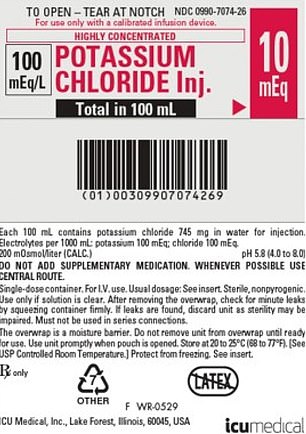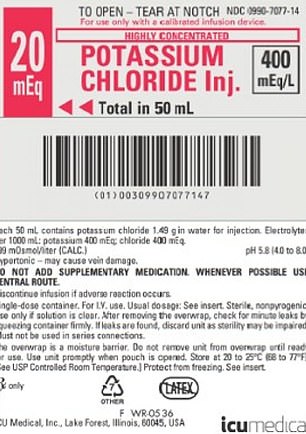An urgent recall has been issued for a mislabeled medication used to treat a blood condition which could lead to fatal overdoses.
Potassium chloride (KCl) injection is primarily used to treat and prevent low levels of potassium in the blood, a condition known as hypokalemia, which affects around 30 million Americans.
It is administered intravenously in a hospital or clinical setting to patients who are unable to take oral supplements of the mineral or when a rapid replacement of it is necessary.
The drug is also the final drug in America’s three-drug lethal injection protocol for inmates on death row, as it stops the heart in large doses.
Texas-based Otsuka ICU Medical LLC announced the voluntary recall for one lot of its Potassium Chloride Injection, 20 mEq (NDC 0990-7077-14) after discovering a mislabeling issue on the product’s outer packaging.
While the correct dosage information (20 mEq) is printed on the label affixed directly to the product bag, this label is not visible when the incorrect 10 mEq overwrap is in place.
If the mislabeled overwrap leads to incorrect administration, an overdose of potassium chloride could occur.
This can cause hyperkalemia, a dangerous elevation of potassium levels in the blood, potentially leading to neuromuscular dysfunction (including muscle weakness or paralysis), listlessness or confusion, low blood pressure, cardiac arrhythmias or cardiac arrest.

Texas-based Otsuka ICU Medical LLC has announced a voluntary recall for one lot of Potassium Chloride Injection, 20 mEq (NDC 0990-7077-14) after discovering a mislabeling issue on the product’s outer packaging
Your browser does not support iframes.
Certain patients are at higher risk for severe or fatal outcomes, including premature infants, individuals on chronic parenteral nutrition, those with a history of cardiac arrhythmias, or patients with renal impairment or failure.
The affected lot, Lot 1030613, Expiration Date: September 30, 2026, was found to have an incorrect overwrap label that identifies the product as Potassium Chloride Injection, 10 mEq (NDC 0990-7074-26).
The company traced the discrepancy to a manufacturing issue.
To date, Otsuka ICU Medical LLC has not received any reports of adverse events related to this issue.
Potassium Chloride Injection (10 mEq and 20 mEq) is used to treat potassium deficiency when oral replacement is not possible.
The product is a highly concentrated, ready-to-use formulation designed for patients requiring potassium supplementation with restricted fluid intake.
The company emphasizes that these injections should not be infused rapidly to prevent potassium intoxication.
Continuous cardiac monitoring and frequent serum potassium testing are recommended during administration.
The affected lot was manufactured on April 15, 2025, and distributed in the US between May 23, 2025, and August 26, 2025.
The lot number (1030613) can be found on the top left corner of the product bag or on the case label.


If the mislabeled overwrap (Left: Incorrect overlap. Right: Correct overlap) leads to administration based on the 10 mEq dosage instead of the correct 20 mEq dosage, an overdose of potassium chloride could occur
Healthcare professionals and facilities in possession of the affected lot are advised to immediately examine their inventory, quarantine any affected product, and follow the company’s recall instructions.
For additional information or to report an issue, customers can contact Otsuka ICU Medical LLC’s customer service or refer to the official recall notice distributed to healthcare providers.
Potassium chloride (KCl) injections have been used medically since the 1950s, though the substance itself has been used for other purposes for much longer.
For instance, potassium chloride has been in large-scale commercial use as a fertilizer since 1861.
